In this article:
Nature has a solution for most of our problems, including the very common dermatological issue – dandruff.
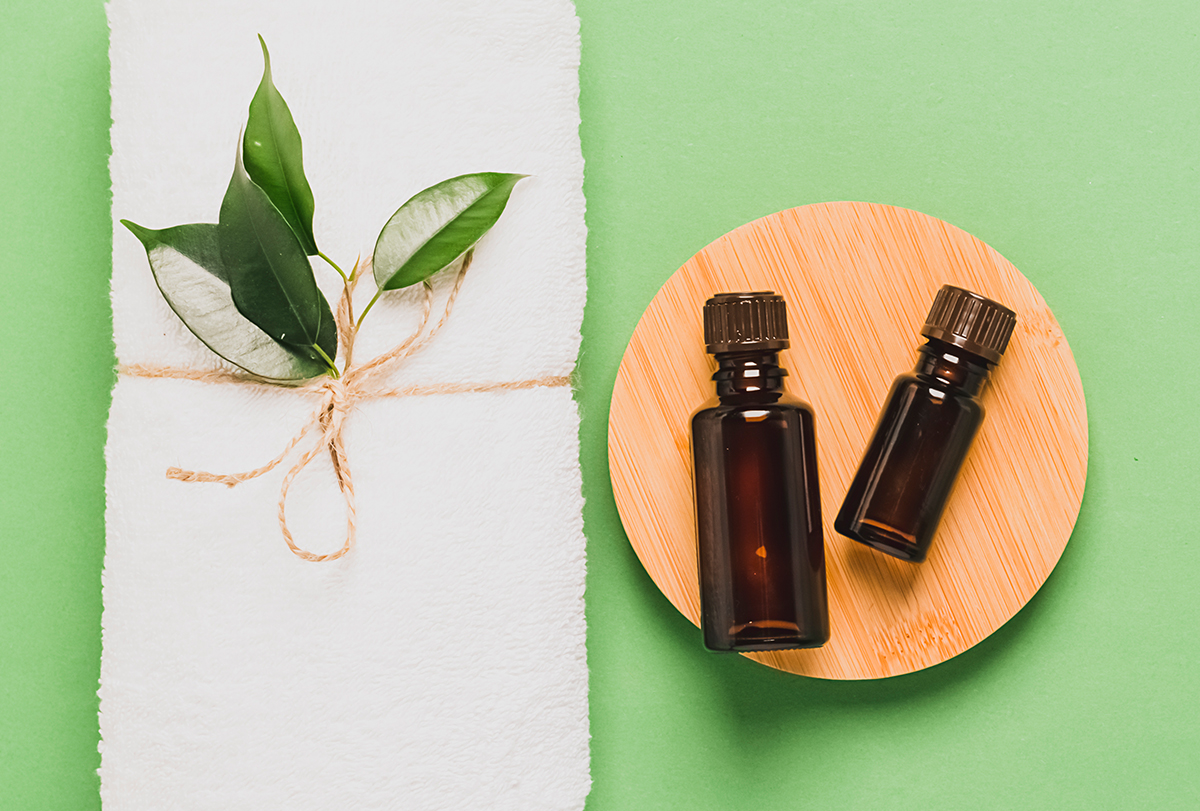
Extracted from the plant, Melaleuca alternifolia, tea tree oil is a boon for people who struggle with a dandruff-infested scalp.
The oil’s use in dermatology can be traced back to the very old Australian tribal communities who used it as a remedy for various skin and hair problems.
In modern times, research has confirmed its activity against fungal and bacterial infections, making it a suitable candidate for antidandruff preparations. (1)
According to experts, massaging the hair with tea tree oil helps treat dandruff and keep the scalp clean and smooth. It also reduces the scalp flakiness associated with dandruff. (2)
But since tea tree oil is a strong essential oil, it is advised to not use it by itself. It should be used with either carrier oils or other useful ingredients.
Ingredients to Mix with Tea Tree Oil for Dandruff Treatment
You can use these ingredients with tea tree oil to treat dandruff.
1. Coconut oil
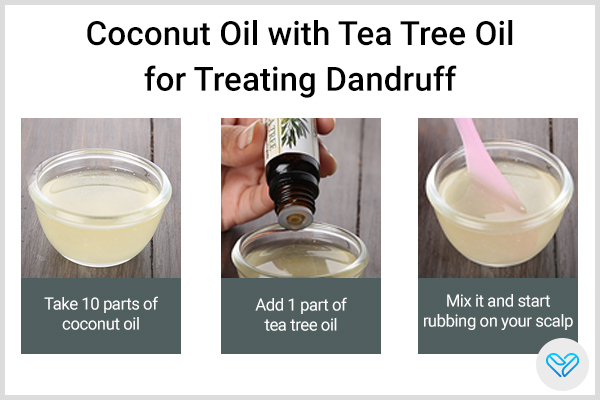
Hair oiling is one of the oldest forms of hair care that is still prevalent to this day, and out of all the different hair oils, coconut oil is probably the most famously used.
Coconut oil is a treasure chest of vitamins and minerals, which make it a great oil for strengthening the hair fibers and boosting hair growth. (3) It adds shine to your tresses and keeps dryness at bay.
But did you know that this oil is also very useful in resolving your dandruff crisis?
Scientists have observed significant changes in scalp health in people who use coconut oil for massaging their roots. In a study, coconut oil supported the growth of good microbes on the scalp, which ameliorated dandruff symptoms and improved hair health. (4)
How to use it:
- Mix coconut oil and tea tree oil in a 10:1 ratio. This means you add a drop of tea tree oil for every 10 drops of coconut oil. Prepare enough oil mixture for your entire head.
- Rub the oil mixture on your scalp. Be gentle and do not use your nails to massage the roots.
- Leave it on overnight, and wash it off the next day.
2. Aloe vera
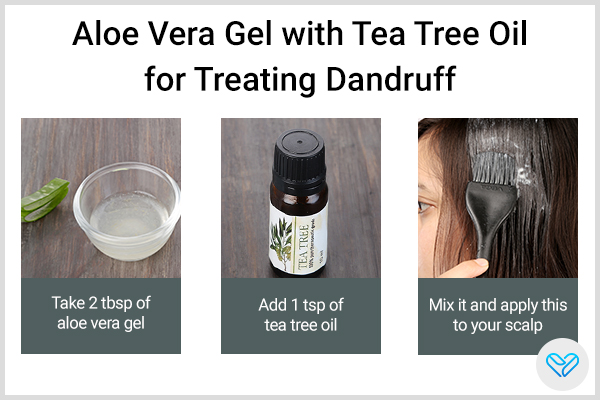
Even if you’re new to the world of self-care or home remedies, you must have heard about aloe vera and its numerous benefits for the hair and skin.
Aloe vera gel is extracted from the leaves of the aloe vera plant. You can get the gel from the leaves yourself if you have an aloe plant.
This all-natural gel is a very potent anti-inflammatory agent that can help soothe your scalp, especially if you suffer from dryness or dandruff. The gel is known to keep away itchiness and skin irritation, both of which are common issues in dandruff. (5)
Moreover, the gel is rich in chemicals called anthraquinones, which are compounds that have strong antifungal properties, making aloe vera a potential candidate for fighting dandruff-causing fungi. (6)
How to use it:
- In a bowl, mix 2 tbsp of aloe vera gel and 1 tsp of tea tree oil.
- Use a cotton ball or a gentle brush to apply this mix to your scalp.
- Leave it on for an hour.
- Rinse it off.
3. Apple cider vinegar
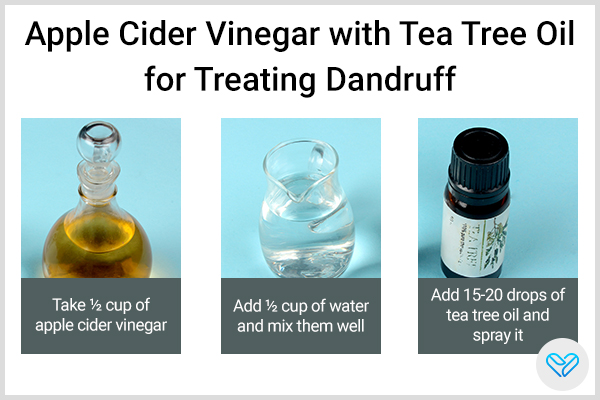
Apple cider vinegar (ACV) is a good old magical compound that is filled to the brim with health benefits. It has become so well known for its amazing therapeutic actions that you can find it at almost every home.
Even for dandruff, ACV has come out on top. Researchers have demonstrated the positive effects of ACV on dandruff-infested scalp. They found out that ACV is a natural antifungal agent, which is why it can kill the dandruff-causing fungi Malassezia furfur. (7)
So, hold off no more and use ACV with tea tree oil to achieve healthy hair!
How to use it:
- Mix ½ cup of ACV and ½ cup of water.
- Add 15-20 drops of tea tree oil to this mixture.
- Transfer the mixture to a spray bottle and shake thoroughly to mix.
- Use this blend to rinse your hair after washing it.
4. Honey
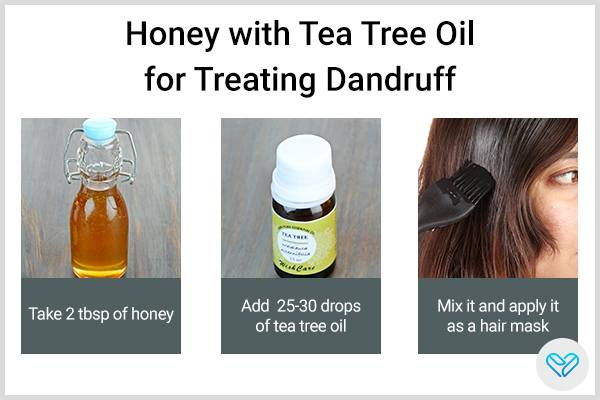
Honey is a natural antiseptic. This means that it will protect you from microbial infections and thus keep you away from problems such as psoriasis and dandruff. (8)
In fact, upon conducting more research on the antidandruff properties of honey, scientists found that using honey topically on the scalp can cause a substantial decrease in dandruff intensity within 14 days. (9)
So, it is no surprise that honey is also on this list of antidandruff remedies.
How to use it:
- Add 25-30 drops of tea tree oil into 2 tbsp of honey.
- Apply this mixture to your hair ends and roots as a hair mask.
5. Fenugreek seeds
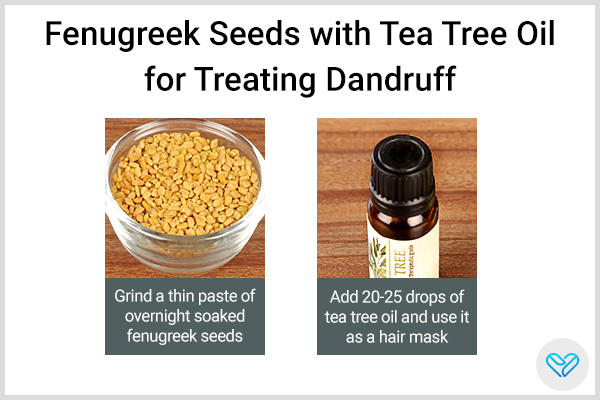
The amazing fenugreek seeds can provide your hair with amazing benefits – from healthy hair growth to complete dandruff relief. These seeds are packed with antioxidants that help restore scalp health. (10)
Additionally, fenugreek seeds have an appreciable quantity of nicotinic acid that has been studied to control dandruff and notably reduce flakiness. They also have the ability to get rid of the dandruff-causing fungus Malassezia furfur, making these seeds a safe and efficacious herbal remedy for dandruff. (11)(12)
How to use it:
- Soak a handful of fenugreek seeds in water overnight.
- Grind them into a thin paste the next morning using a little water.
- Add 20-25 drops of tea tree oil and blend again.
- Use this paste as a mask on your hair for 2 hrs.
- Wash it off.
Most-Asked Questions
How much carrier oil do I use with tea tree oil?
For every 10 drops of tea tree oil, use around 30 ml of carrier oil.
How many times do I need to apply tea tree oil to my hair to fight off dandruff?
Twice weekly tea tree oil application is good enough to get relief from dandruff.
Other than dandruff, what else is tea tree oil good for?
Tea tree oil is useful to treat dryness, itchiness, and fungal infections of the scalp.
Final Word
Combine tea tree oil with these ingredients for dandruff treatment: coconut oil to promote hair health, aloe vera for its soothing and antifungal properties, apple cider vinegar as a natural antifungal agent, honey for its antiseptic qualities, and fenugreek seeds for its abundant antioxidants and nicotinic acid.
These combinations help combat dandruff and improve scalp health.
- Was this article helpful?
- YES, THANKS!NOT REALLY


